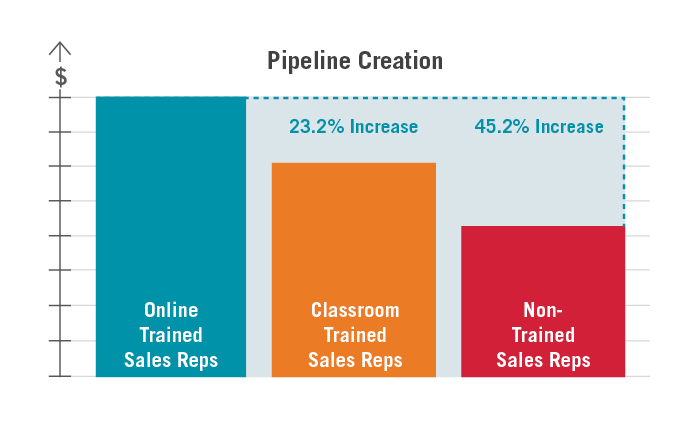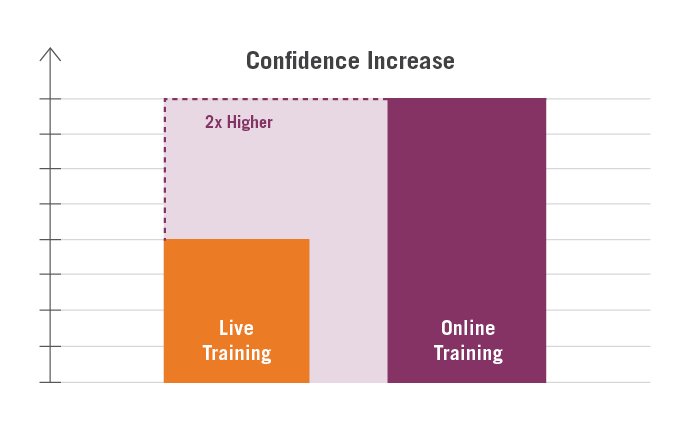
When it comes to creating lasting behavior change, most sales leaders assume that online sales training is just a pale imitation of the in-person classroom. But what if you could roll out an online sales training program that was proven as effective—if not more effective—than classroom training?
It’s not just wishful thinking. Corporate Visions recently partnered with a Fortune 250 software company to put online training and traditional classroom training head-to-head.
So, what are the pros and cons of online training versus classroom training? And how do you know whether online sales training will actually drive better performance from your team?
Training Online versus Training in the Classroom
An industry survey by Corporate Visions identified that 65 percent of companies plan to increase their investment in virtual training alternatives (while classroom training investments remain flat or slowly decline).
However, only 10 percent believed virtual training could be as good as live, instructor-led classroom events when it comes to behavior change.
This begs the question: Why buy more if you believe it’s not as effective?
The research revealed that time-out-of-field (TOOF) pressure from managers is the biggest concern. In fact, they ranked it twice as high as budget concerns. Which means many are willing to plug their nose and dole out online training to appease field concerns while keeping their fingers crossed that it will actually do some good.
Something is better than nothing, right? Not anymore.
A new, controlled field trial finally proves the power of online sales training in creating better outcomes, not just offering a more cost-efficient alternative.
Research Proves the Power of Training Sales Reps Online
You’ll find several studies promoting the benefits of online classes in academia. One such study from MIT showed “improvement among online students that is equal to or better than in any of the previously studied traditional classes.”
But, until now, there’s been very little research into the power of online training in a B2B sales context.
We partnered with a Fortune 250 software company to conduct a controlled sales training field test, using B2B sales teams in the same market segment over the same time period. Sales reps were randomly selected to be part of one of three groups:
- No Training
- Live Classroom Training
- Online-Only Training
Each of these teams was exposed to the exact same training content. The only difference was whether the training was delivered live or in a recorded online environment.
After they completed the training, Data scientists tracked each groups’ sales performance results in terms of building pipeline and the annual contract value of their deals.
The results?
Sales teams who completed online training delivered 23.2 percent more pipeline than similar teams who received live classroom training.

The online participants showed a slightly lower annual contract value (6.1 percent) than the live, classroom-trained reps. But still a significantly higher (85.2 percent) improvement over those who received no training at all.

The company conducting the test considered the 6.1 percent difference to be “close enough” to convince them they can scale programs more efficiently and effectively using online as an alternative to classroom training.
And it gets better:
Sales reps who completed online training experienced twice the boost in confidence levels when engaging executive decision-makers, compared with those who attended live classroom training.

This kind of confidence boost is a key qualitative indicator of how your salespeople engage with the training. When they’re actively engaged, your reps walk away with both newly learned skills and the confidence to immediately apply those skills in the field.
But why such a drastic improvement? The self-paced, flexible, and highly individualized experience of online training is simply not possible in a classroom setting.
6 Benefits of Online Sales Training
Here are six noteworthy advantages of training your sales reps online versus using a traditional classroom training model:
1. Flexible Learning.
In an era where self-pacing, flexibility, and individualized learning are increasingly favored, the time-bound classroom environment struggles to deliver. Learning in an online recorded environment is self-paced and flexible, so your reps can gradually acquire and retain critical skills. Best of all, this model doesn’t interfere with your day-to-day workflow.
2. More Practice.
One of the most profound factors in creating behavior change and instilling deep skills knowledge comes from the opportunity to practice in a stand-and-deliver environment. In an online training environment, analysis shows that salespeople typically practice six times before submitting their assignment. Which, arguably, is much more practice than you get in a live or virtual classroom.
3. More Complete Assignments.
Often, participants in live events are part of teams and only get to experience part of a role-play. Or, they miss a chance entirely when time is up in the room. In the online recording approach, everyone must practice and complete an assignment to demonstrate proficiency.
4. More Useful Coaching.
In the classroom environment, instructors are hard-pressed to give instant, meaningful feedback on the participants’ incomplete performances. Also, no one is taking notes to capture the coaching. Online recorded assignments, on the other hand, receive scoring against a documented rubric and detailed, written coaching notes with explicit recommendations for how to improve.
5. Better Peer Examples.
Watching your peers in a live or virtual classroom can be a painful exercise. Everyone is fumbling through their practice sessions with only the occasional star performance. In the online recorded environment, however, you can see and learn from only the best of the best examples among your colleagues.
6. More Scalable.
In-person training requires careful coordination of travel and scheduling time out of the field. But online training enables you to quickly respond to your strategic needs and execute large-scale program rollouts in weeks vs months (or years) across your remote or global salesforce. It certainly beats the plodding roadshow of visiting every individual location.
Your ultimate goal of sales skills training is behavior change. To that end, there’s no substitute for observable practice time and demonstrated proficiency.
Final Thoughts and Your Next Steps
The emerging online environment shifts away from the traditional classroom setup and its inherent limitations to place a heavier emphasis on the practice and coaching components—both so essential to instilling lasting behavior change in your reps.
With a flexible, online environment, you provide your sales team with training that works inline with the workflow of each participant. You won’t need to take them out of the field. You can more quickly deploy and scale just-in-time training to meet the strategic demands of your organization. And, you can now feel confident knowing you’re going to deliver the same or better results as an in-person classroom.
For more details about this research and how online training works, download our State of the Conversation Report: Can Virtual Training Be Better Than the Classroom?





